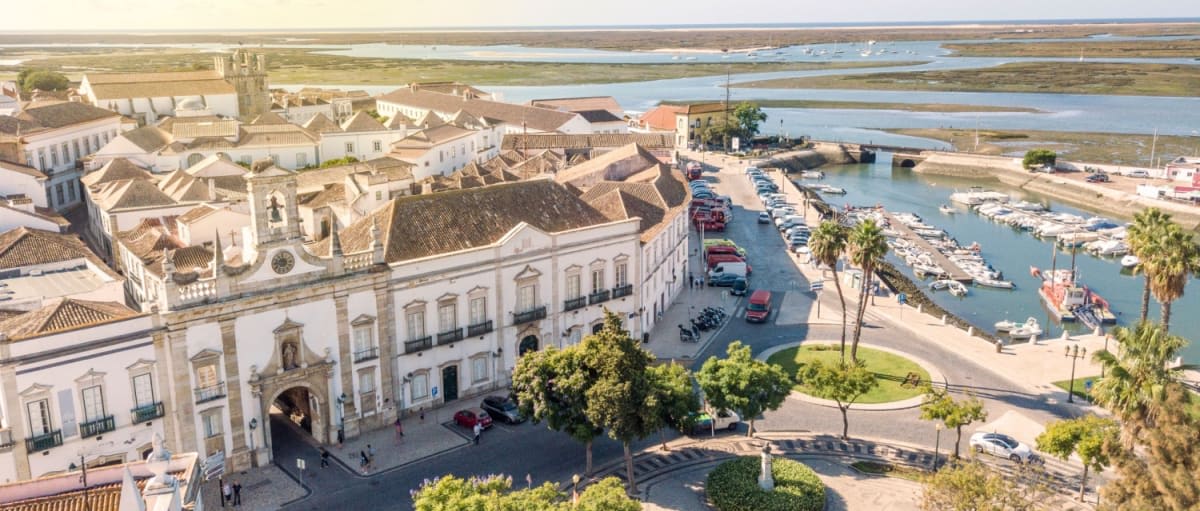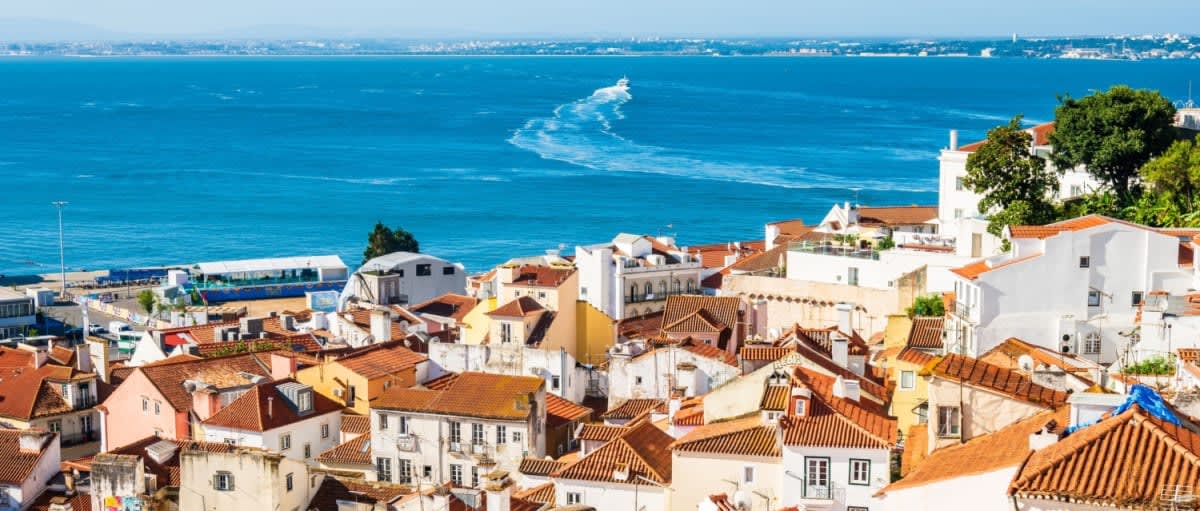As the cultural capital of the Algarve and gateway to the southern coast, Faro blends history, sunshine and accessibility like nowhere else in Portugal. Buying property in Faro will get you a home in the heart of one of the country’s most desirable regions.
Set along the tranquil Ria Formosa lagoon, this charming city has long been overshadowed by flashier resort towns. But Faro is quietly becoming a buyer’s favourite – offering a more authentic year-round lifestyle, good transport links, and excellent value for money compared to coastal hotspots further west.
Whether you’re looking for a holiday apartment, a full-time base or a long-term investment, Faro delivers. From the cobbled streets of the old town to marina-front developments and peaceful countryside villas, the property market here has real variety – and a slower pace that suits second-home buyers and relocators alike.
In this article, we explore what makes Faro so special – including property prices, local lifestyle, standout neighbourhoods and practical steps to buying a home in this sunny southern city.
Download the Portugal Buying Guide
Contents
- Why buy property in Faro?
- Property types and what you can get for your money
- Best areas and parishes to buy property in Faro
- Lifestyle, climate and outdoor living
- Year-round appeal and long-term potential
- Ownership costs and ongoing expenses
- How to buy property in Faro
- Start your property journey in Faro
- FAQs about buying property in Faro

Why buy property in Faro?
Faro is the administrative and cultural heart of the Algarve – and one of Portugal’s most liveable cities. It offers all the benefits of coastal living, without the seasonal crowds of nearby beach resorts. With its historic walled centre, vibrant marina, and strong transport links, Faro is increasingly popular with overseas buyers seeking a balance of charm, convenience and year-round life.
The city is home to Faro International Airport – the main air hub for the Algarve – and sits along the regional train line, making it one of the best-connected places in southern Portugal. It’s also at the heart of a growing urban corridor alongside Loulé and Olhão, with a planned metro system and investment in housing, services and infrastructure.
Unlike purpose-built tourist towns, Faro is a working city with a resident population and strong local economy. That translates to better amenities, schools, healthcare and transport – as well as stable property demand outside of the summer high season.
With the Ria Formosa natural park on its doorstep and a reputation for sunshine, seafood and slower living, Faro offers an unbeatable combination for buyers wanting a slice of the Algarve with long-term potential.
For a closer look at the whole purchase process, claim your free copy of our Portugal Buying Guide:
Download the Portugal Buying Guide
Property types and what you can get for your money
Faro’s property market is varied and still offers excellent value compared to other parts of the Algarve. Whether you’re seeking a coastal holiday apartment, a full-time home near schools and services, or a countryside villa with views, there are plenty of options to suit a range of budgets.
In the historic old town (Vila-Adentro), you’ll find renovated townhouses and character apartments with original features like stone arches and tiled facades. These properties appeal to lifestyle buyers and boutique investors but are limited in supply and often come at a premium.
More modern apartments and duplexes can be found in neighbourhoods like Montenegro and São Pedro, often with balconies, underground parking and access to public transport. Prices here typically start around €200,000–€250,000 for a two-bedroom apartment, rising to €400,000+ for new-builds or larger homes in prime locations.
If you’re after more space, look to Estoi or Santa Bárbara de Nexe for villas and quinta-style homes. Detached properties with gardens and pools can range from €400,000 to over €1 million depending on size, views and condition.
Buyers who act early can still find value in up-and-coming zones around the university or future Metro stops, where regeneration and demand are growing.
Best areas and parishes to buy property in Faro
Faro is divided into four parishes, each offering something different in terms of lifestyle, property types, and price points. Whether you’re seeking historic charm, modern convenience, or rural peace, you’ll find a setting to suit your goals.
Sé e São Pedro forms the heart of Faro, covering the historic old town, marina, and city centre. Expect character homes, walkable streets, and easy access to cafés, markets and cultural venues. This area suits buyers who prioritise atmosphere and location, though parking and space can be limited.
Montenegro, close to the airport and university, is popular with families and rental investors. It’s one of Faro’s more modern areas, with apartments, villas and proximity to Faro Beach. You’ll also find good schools, supermarkets and growing demand from professionals and students alike.
Conceição e Estoi offers a more traditional setting. Think whitewashed villas, cobbled lanes and views across the hills. This area is ideal for those seeking a quieter, rural feel – while still being within 15–20 minutes of central Faro.
Santa Bárbara de Nexe lies further inland, popular with expats and retirees. With its spacious villas, country lanes and peaceful pace, it’s a favourite for those looking for privacy, gardens and Algarve sunshine all year round.
Lifestyle, climate and outdoor living
Faro offers the best of southern Portugal’s lifestyle – sunny skies, laid-back days, and easy access to coast and countryside. As a city with over 3,000 hours of sunshine per year, it’s one of the sunniest places in Europe. Summers are long, hot and dry, while winters are short and mild, with daytime temperatures often reaching 15–20°C.
Faro is surrounded by the Ria Formosa Natural Park, a vast lagoon system that protects the coast and provides a haven for birds, boaters, and beachgoers. Whether you’re kayaking through channels, birdwatching for flamingos, or walking the trails, the area is ideal for outdoor living. The nearby islands of Culatra, Farol and Deserta are only reachable by boat and offer pristine beaches and a peaceful escape from the mainland.
Within the city, Faro is known for its vibrant marina, historic core, lively food markets, and café culture. You’ll find a relaxed yet cosmopolitan feel, especially as the city increasingly attracts digital nomads, young families and retirees from across Europe.
With fresh seafood, local produce, and a slower pace of life, Faro offers all the charm of the Algarve – without the resort-town intensity.
Year-round appeal and long-term potential
Unlike some Algarve resorts that quieten down outside of summer, Faro stays active all year. It’s a regional capital with universities, a growing international population, and a real sense of everyday life – not just seasonal tourism.
Faro International Airport welcomes nearly 10 million passengers annually, with direct flights across Europe, including budget carriers. This makes it easy to visit year-round and ensures strong potential for both short-term holiday lets and longer stays. The planned Algarve Metrobus system, which will connect Faro with Loulé and Olhão, is set to boost local infrastructure and accessibility by 2029.
The University of the Algarve brings students and academic staff into the housing market, supporting steady rental demand even outside peak seasons. Faro’s proximity to the Ria Formosa and its thriving ecotourism industry also attracts nature lovers, digital nomads, and retirees seeking sunshine with substance.
With ongoing investment, strong connectivity, and a lifestyle that’s both laid-back and lively, Faro is positioning itself as one of the Algarve’s best long-term bets – not just for holidays, but for full-time living and sustainable returns.
Ownership costs and ongoing expenses
Buying a property in Faro comes with relatively manageable ownership costs, especially when compared to larger cities or Algarve resort towns. However, budgeting correctly for both purchase and ongoing expenses is essential.
The main annual cost is the IMI (Imposto Municipal sobre Imóveis), a local property tax based on the property’s rateable value. Most homes fall between 0.3% and 0.45%, with exemptions available for energy-efficient properties or first-time buyers in certain categories. Luxury homes may be subject to AIMI (additional property tax) if valued above €600,000 individually or €1.2 million jointly.
Apartment owners will also pay condominium fees to cover shared services such as lift maintenance, cleaning, and common area repairs. These typically range from €30 to €100 per month, depending on the building’s facilities and location.
You should also budget for insurance, utilities (water, gas, electricity), and if applicable, property management or lettings support. For short-term rentals, ensure your property qualifies for an AL (Alojamento Local) licence, though Faro’s restrictions are less tight than in Lisbon or Porto.
Planning a budget? Consider locking in favourable exchange rates with a forward contract – especially for larger transfers like deposits or renovations. Speak to a currency specialist to explore your options.
How to buy property in Faro
Buying property in Faro follows the same legal process as elsewhere in Portugal and is open to all foreign buyers. You’ll first need a NIF (Número de Identificação Fiscal) – your Portuguese tax number – which is required to open a bank account and complete the purchase.
Once you’ve found a property, your lawyer or agent will carry out due diligence, check land registry records and draft the promessa de compra e venda (preliminary contract). This is usually signed with a 10% deposit. Final completion takes place at a notary’s office, where the deed (escritura) is signed and the remaining balance paid.
The process generally takes 4–8 weeks. New-build or off-plan purchases follow a slightly different structure (VEFA), with staged payments and completion upon handover. A lawyer is highly recommended throughout.
If you’re planning to let the property as a holiday rental, check licensing requirements for an AL (Alojamento Local) licence. Restrictions are less strict in Faro than in Lisbon or Porto, but rules vary between parishes.
Start your property journey in Faro
Explore property for sale in Faro – from modern marina apartments to historic townhouses and country villas. Want help narrowing your search? Book a free consultation with one of our local property experts.
If you’ve still not picked what part of the country you want to call home, use our other location guides to work out where to buy property in Portugal. For greater detail on the process, read our how to buy property in Portugal articles. And for a sense of life after the move, we’ve a collection of resources on living in Portugal.
FAQs about buying property in Faro
Yes. Portugal has no restrictions on foreign property ownership. The process is transparent, safe, and open to buyers from anywhere in the world. You will need a NIF number and a local bank account to get started.
Absolutely. Faro is a working city with a resident population, international airport, university, and strong infrastructure. It stays vibrant beyond the summer season, making it ideal for permanent living as well as holidays.
Two-bedroom apartments in good areas typically range from €200,000 to €400,000. Detached villas with land can start from €450,000 and go above €1 million in more sought-after areas like Estoi or Santa Bárbara de Nexe.
Yes – Faro allows short-term holiday lets (Alojamento Local), though licensing is required. Rules vary between parishes, so it’s important to check local guidelines before committing if rental income is part of your plan.
Expect to pay IMI property tax (typically 0.3–0.45% annually), utility bills, condominium fees (if in a shared building), and insurance. Most owners also budget for occasional maintenance and, if renting, management fees.








